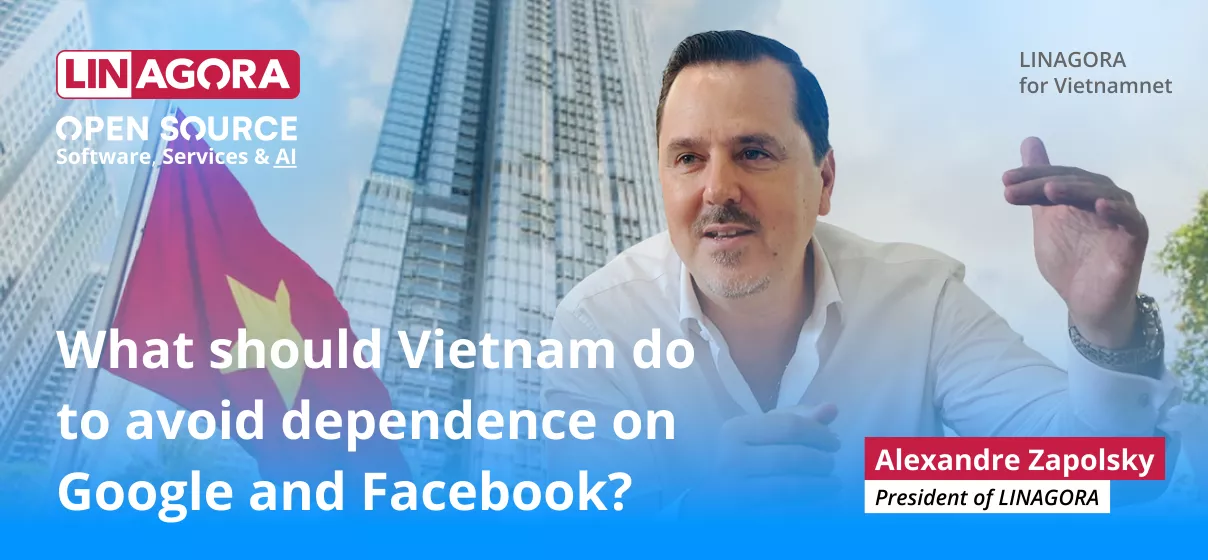What should Vietnam do to avoid dependence on Google and Facebook?

Vietnamnet is part of the Ministry of Information and Communications in Vietnam, performing the function of the ministry's press agency; disseminating and propagating the Party's viewpoints, lines, and state policies and laws; providing information on the fields of information and communication, as well as the political, economic, cultural, and social situation inside and outside the country.
Alexandre Zapolsky (born in 1977) is an expert in Open Source software and a member of the French National Digital Council. Since his days as a student, he founded the software company Linagora and has been developing it ever since. Throughout his career, Mr Alexandre Zapolsky has persistently pursued the idea of the 'Third Digital Way,' an alternative choice to the American (GAFAM) and Chinese (BATX) tech giants.
The President and co-founder of LINAGORA, Alexandre Zapolsky, believes that open-source technologies and software “Make in Vietnam” will be a digital sovereignty milestone, helping Vietnam not depend on Big Tech.
Why did you initiate the establishment of a sovereign Open Source community in Europe?
Digital sovereignty is the ability to manage dependency on technology providers. A country cannot achieve digital sovereignty if they do not master Open Source technologies. Open Source helps us avoid total dependence on any specific software provider.
This is particularly true for artificial intelligence. If you don't have an open large language model (OpenLLM), you will depend on a proprietary large language model system. Most of these platform systems will come from the US or China.
Proprietary language models will utilize undisclosed datasets. Developers train their AI with that data in their own way. The lack of control over input and output data poses a significant risk to users.
Closed-source AI may generate an inappropriate response regarding your country’s cultural or geopolitical interests. For instance, how would AI respond if asked about a disputed territory between multiple nations? In my opinion, no country should be dependent on the perspective of other countries.
There shouldn't be only one or a few artificial intelligence models like OpenAI from the US or Baidu AI from China. We need 'biological diversity' in the digital environment, with the emergence of various artificial intelligence models. That's what open-source LLM can bring to the world.
From your perspective, what significance does digital sovereignty hold for countries?
I'll take the example of the conflict in Ukraine. We've seen what happened to Russia when it was cut off from most software providers from the US.
Under pressure from sanctions, MongoDB - a data solutions company - blocked all access to its services for all companies and agencies associated with Russian entities. In just one day, these organizations no longer had access to their data .
Even worse, shortly afterward, MongoDB decided to erase all data entirely. This makes it completely impossible for Russian customers of this proprietary software provider to recover data from the services they rely on.
This is a specific example of the importance of digital sovereignty, especially with services like data. If you rely on closed-source international software providers or solutions, you are at risk. You may find yourself unable to access your own IT systems one day.
To avoid such situations, you need to develop your core infrastructure based on open-source. This is what we've built in France and Europe, an initiative called 'Digital Public Infrastructure’ ( DPR ). It is built on open standards with open-source software tools.
Why, despite its numerous advantages, is open-source not more widespread?
The main challenge for open-source is the dominance from GAFAM (Google, Amazon, Facebook, Apple, Microsoft). The market capitalization of GAFAM even surpasses the entire French budget.
These tech giants wield immense financial power and economic leverage, stemming from advertising budgets, marketing, and lobbying efforts.
They create barriers in the tech market, making it difficult for open-source to compete. Marketing and convincing users to adopt open-source solutions also require significant budgets or resources.
However, despite these challenges, more and more people are realizing that open-source is beneficial for the planet, individuals, and society overall. The popularity of open-source is rising, especially among the younger generation. I believe we are still in the early stages of this journey, and the world will increasingly embrace Open Source.
Do you have any advice for Vietnam in protecting its national digital sovereignty?
Every country should have the ability to manage its own infrastructure, without relying on any other country. In Vietnam, I see some companies very successful in building digital sovereignty. They use open technologies with the assistance of some foreign experts and organizations, yet remain entirely independent in their technology infrastructure.
In France and other European countries, there are many programs sponsoring open-source companies. For example, Linagora is currently sponsored by several entities to develop a solution called Twake workplace, aiming to replace Microsoft 365.
The pillars of digital infrastructure, including operating systems, management, directories, data... need to be built on open-source. I think the Vietnamese government should sponsor research, development, and the scaling of software produced in Vietnam.
“Make in Vietnam” forum, based on the initiative of the Ministry of Information and Communications, is a great program to honor domestically produced products. However, to further develop open-source technology, Vietnam needs a stronger financial mechanism to support open technology production units.
Vietnam shares some similarities with India. Over the years, India has excelled in software outsourcing, but they are also gradually transitioning to owning, mastering, and exporting technology.
“Make in Vietnam”program will serve as a precursor to further develop technologies, especially open-source software created and produced in Vietnam.
Thank you!